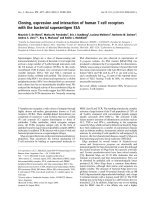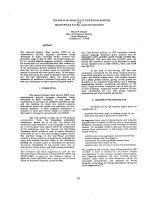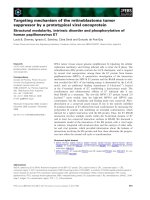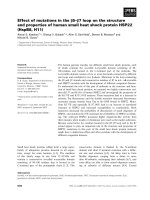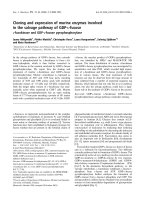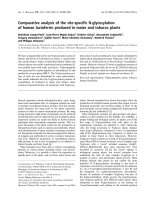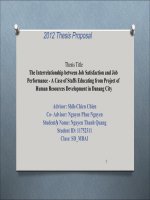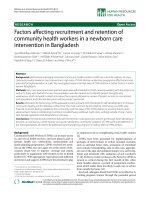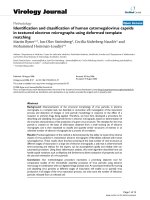- Trang chủ >>
- Thạc sĩ - Cao học >>
- Luật
The objective causes and conditions of the situation of crimes of human health infringement in the Southwestern provinces
Bạn đang xem bản rút gọn của tài liệu. Xem và tải ngay bản đầy đủ của tài liệu tại đây (415.85 KB, 6 trang )
Tạp chí Khoa học Viện Đại học Mở Hà Nội 51 (01/2019) 25-30
25
THE OBJECTIVE CAUSES AND CONDITIONS OF THE
SITUATION OF CRIMES OF HUMAN HEALTH
INFRINGEMENT IN THE SOUTHWESTERN PROVINCES
To Ngoc Duong*1
Date received the article: 4/7/2018
Date received the review results: 4/1/2019
Date published the article: 25/1/2019
Abstract: The region of the Southwestern provinces is one of the areas where the crime
situation in general and the situation of human health infringement (HHI) in particular are having
extremely complicated developments. Although legal protection agencies have made great efforts
on crime prevention, the results of crime prevention in general and HHI in particular are still
limited compared to the requirements set out. In order to effectively prevent these crimes in the
Southwestern provinces, clarifying the objective causes and conditions of these crimes has a
significant meaning. This article focuses on clarifying the objective causes and conditions of the
situation of HHI.
Keywords: Reasons; Conditions; Crime situation; Crime of human health infringement; The
Southwestern provinces.
1. The concept: causes and
conditions of the situation of human health
infringement
There
are
currently
many
perspectives on the causes and conditions of
the crime situation12, however, most of the
perspectives agree that: “The causes and
conditions of the crime situation are
understood as a system of negative social
phenomena in the corresponding socioeconomic form that plays a decisive role in
the apperance of the crime situation as a
consequence”.23This definition emphasizes
the socio-economic environment as the
objective causes and conditions of the crime
situation.
From this definition, it is possible to
understand that the causes and conditions of
HHI situation in the Southwestern region is a
system of negative social phenomena in the
socio-economic
environment
of
the
Southwestern provinces that plays a decisive
role in the apperance of HHI situation as a
consequence.
The system of negative social
phenomena exists in the socio-economic
environment of the Southwestern provinces,
including negative social phenomena in the
PhD Studen Law – Course 7
Pham Van Tinh (2008), Causes and conditions of the crime situation in our country today - Model of
theory, State and Law Journal, No. 6/2008, Page 79-83; Hanoi Law University (2006), Criminology
textbook, People's Public Security Publishing House, Hanoi, page 135
2
Vo Khanh Vinh (2008), Criminology textbook, People's Public Security Publishing House, page 87.
*
1
26
Nghiên cứu trao đổi ● Research-Exchange of opinion
family
environment,
educational
environment, socio-economic environment
and impacts from victims.
2. Negative factors in the family
environment
A research in HHI offenders in the
Southwestern provinces shows that most
offenders are those who live in imperfect
family environments such as families with
loose structure, incomplete families, families
with relatives who violate against the law.
This has affected the process of formation
and development of personalities, from
which easily develops crimes in general, and
HHI in particular.
Living in an unhappy family, parents
often have quarrels and domestic violence to
a frightening extent, children in that
environment will gradually lose faith in life,
helplessness in spirit, not conscious of
studying and training themselves under the
guidance and care of their parents. Since
then, they become depressed, imitate and
participate in negative social groups, act on
crowd psychology with spontaneous nature,
express the impulse of youth, leading to
criminal acts. Through a survey of 300 HHI
offenses in the Southwestern provinces,
there are up to 82 people live in an
unfavorable
family
environment
31
(accounting for about 27.3%) that is, these
defendants have parents or siblings who
have a criminal record; domestic violence
occurs frequently; their father and brothers
often drink, have quarrels with neighbors...
In addition, low-educated parents
with less understanding of law are also a
cause of limited education to their children.
According to the survey results of 250
3
4
defendants who intentionally cause injury in
the Southwestern provinces, 82/250
defendants (accounting for 32.8% of the
total of defendants who intentionally
causing injury) live in the family or father,
mother or adult in the family with low
education.42This suggests that parents with
low education have a significant effect on
their children’s tendency to commit crimes.
Families’ pampering children also
contributes to forming bad qualities and
personality in children. Therefore, parents are
too indulgent, easy to meet the requirements
of their children, inevitably forming a bad
personality as a habit of enjoying material,
wasting money and not caring for others,
even lack of patience and hardship. Excessive
pampering will cause children to depend on
others, not know the value of labor and how
to be independent in the future. Or it derives
from parents’ different viewpoint in raising
children. While father teaches children,
mother pampers and protects them. When
parents teach children, she intervenes. Since
then, children will not have the right
conception and will always hide in the
"protection umbrella". When children violate
the law, it is a violation of administrative,
civil regulations as a heavy case or criminal
as a serious case, parents find ways to bribe
so that they are not handled by the law.
Some families are not exemplary and
violates the law (gambling, alcohol, theft,
criminal records ...), so they are not
sufficiently knowledgeable and are not
qualified to fully guide social norms for
children, there is no reasonable teaching
method. Consequently, children will
underestimate themselves and their family
Survey results of 300 judgments of the People's Court of Southwestern provinces about SHHI.
Survey results of 300 judgments of the People's Court of Southwestern provinces about SHHI.
Nghiên cứu trao đổi ● Research-Exchange of opinion
members, leading to low self-esteem,
depression and negative susceptibility. Brutal
treatment of parents with children such as
beating or cursing when they make mistakes
will form negative personalities such as
stubbornness, revenge intention and it is very
easy for them to participate in groups with the
same personality, like to fight, find ways to
relieve the inhibitions they have to endure.
They turn frustrations from their parents’
punishment to others by destructive,
aggressive, fighting acts. For example: On
the morning of July 27th, 2017, while Thach
H and Thach ST were talking and drinking,
they had a quarrel. Thach ST used his hand to
hit Thach H's head but H dodged it and Thach
H used his right hand to hit Thach ST twice.
Then Thach H went downstairs to get a knife
about 25cm long (a spear) to the front. At this
time, Thach H saw Thach ST leaving, so he
chased him and used his right hand to hold a
knife and cut one piece from his back from
the top down and it hat the head and temple.
Then, Thach H removed the knife at the scene
and went into the house, while Thach ST was
taken to the emergency room by the relatives
at CN District General Hospital. On August
7th, 2017, he was discharged from hospital.
Through assessment, the disability rate of T
was 33%.51The case file showed that Thach
H lived in the family with many relatives
violating the law such as H's father who had
2 criminal convictions for intentionally
causing injury, 01 criminal record, H himself
also had a low level of education. Therefore,
in the locality, H was a stubborn man,
learning by his father's nature, ready to use
force to resolve conflicts, even if it was the
smallest contradiction.
5
27
All the causes from that family can
lead to the formation of a class of young
people in society willing to use violence to
resolve conflicts, using violence to resolve
conflicts. That is the root cause of the
violation of the offenses of HHI in the
Southwest provinces.
All the family causes can lead to the
formation of a class of young people in
society willing to use violence to resolve
conflicts. That is the root cause of violation
of HHI offenses in the Southwestern
provinces.
3. Negative factors in the
educational environment
Characteristics of the Southwestern
provinces are flood season every year. In the
flood season, the flooded water makes many
people living in the watershed such as An Phu
(An Giang province), Tan Chau (Dong Thap
province) and Dong Thap Muoi (Long An
province) even more difficult. Students in
flooded areas are very arduous due to ferry,
muddy roads, flood. In order to reach the
school, not only do they have to cross dozens
of kilometers of land but they are also
unsteady on boats and “slings” in the fast
flowing water. It is from this difficulty that
many students in flood areas have not been to
school or go to school in very difficult
conditions. Therefore, studying in these areas
is still limited, not being properly concerned.
Besides, like many other localities,
currently most schools in the Southwestern
provinces mainly carry out the teaching of
knowledge to students, not focusing on
teaching living skills. The educational
program also underestimates the practice and
application of knowledge. The education
Judgement no 05/2018/HSST dated 27, April, 2018 of the People’s Court of province Tra Vinh
28
Nghiên cứu trao đổi ● Research-Exchange of opinion
methods are largely passive and imposing
and do not apply active teaching methods, so
it does not promote the creativity and
activeness
of students.
The tests,
examinations and evaluations are backward
and unreal. In some places, students are
overcrowded due to too much private lessons.
Many students from poor families have no
conditions to take private lessons, so they
cannot keep up with the program, so they are
tired of learning because of the lack of
fairness in education and loss of trust in
teachers. The results of social surveys for 120
form teachers and teachers of civic education
at upper and lower secondary schools show
that only 11% of respondents answered that
the school held quarterly meetings on the
content of law and living skills for students;
31% answered that it was infrequent; The
remaining 58% answered that there was little
or no.61
4. Negative impacts of socioeconomic environment
In the market economy, despite being
incomplete, the market economy has made a
difference, increasing social stratification
among the population classes. Currently,
inequality mainly occurs between urban and
rural areas and is increasing; The level of
internal inequality is also increasing. The
disparity in living standards is increasing,
creating a social stratification in most social
groups.72Income
disparity
between
population groups tends to increase and the
gap between urban and rural areas, between
regions and between ethnic groups in the
6
Southwest provinces as well as the whole
country are still significant. The urban
stratification is strongest, then to rural areas.
Increasing social stratification makes rich poor gap wider. Social inequalities that
exceed reasonable limits can cause
instability, negativity and social conflict.
Social stratification creates diversity in the
patterns of rich and poor lifestyles. The poor,
especially ethnic minorities, are poorer and
poorer compared to the living standards of the
rich. Inequality has and will cause negative
reactions. In addition, the implementation of
democracy at the grassroots level has not
been guaranteed, it has been provoked and
manipulated by bad guys, so the people feel
annoyed, easy to commit acts of violating the
law, infringing upon life, health of others
when bad situations occur.
5. Causes from victims
In the crime of HHI, there is an
important cause, which is the fault from
victims. Victims of crimes are individuals
and organizations that suffer from
consequences about their lives, health, mental
issue, emotion, property or other legitimate
rights and interests caused by direct
offenses.83Victims of HHI crimes are
individuals who suffer from physical and
mental damage. It is necessary to distinguish
2 cases: victims at fault are the case their
behavior could be a cause of crime
development or the conditions for crime to
implement.94The victims at fault are the
victims who have committed acts, behaved
not in accordance with moral standards, laws,
Summary of the author's survey results on education of living skills for students.
Lai Hoa, Rich-poor gap between remote and distant places, Electronic Newspaper of Voice of Vietnam,
course: dated
13/12/2018.
8
Tran Huu Trang (2011), Victims of crime, Vietnam Education Publishing House, page 19.
9
Tran Huu Trang (2011), Victims of crime, Vietnam Education Publishing House, page 24.
7
Nghiên cứu trao đổi ● Research-Exchange of opinion
facilitated or promoted criminal acts to be
done. In other words, the victims’ behavior
and criminal acts are closely related to each
other. The victims’ behavior is one of the
motivating factors, giving rise to crime, such
as the case where victims lack knowledge of
the law, leading to conflict with the accused
in understanding the problem; or victims like
to show off; it can also be a disdain, disregard
for being a low or poor cultural person; It can
also be victims’ betrayal in borrowing money
and property. Or the victims have an
unethical lifestyle, violating against the law.
It is also possible that the victims have the
ability to defend themselves weakly, not alert
to the attack of the accused after events such
as quarrels, land disputes, traffic collisions,
although they have been reconciled but
revenge may still happen. Especially the
crime is due to being strongly agitated by the
victim's fault.
A typical example is Nguyen Van
Thanh case in Kien Giang. On the night of
December 7th, 2017, Thanh was drinking
with Nguyen Minh Van, 42 years old and
others at Mr. Vo Dinh Trong’s inn, in area 2,
Duong Dong town, Phu Quoc district. After a
while, Thanh went to sleep first. After a
while, when the party ended, Van also
returned to his house, but due to opening the
door and causing a loud noise, Mr. Trong (the
owner of the inn) stepped out to remind Van,
they had a quarrel and a fight. At this time,
Thanh woke up and saw the owner was
beaten by Van. Although it was not related to
him, instead of interfering, Thanh rushed to
defend Mr. Trong and pushed Van to fall on
the floor and was unconscious, the next
10
29
morning the victim was deceased at the
hospital.10
In summary, the negative factors in
the living environment, including negative
factors in the family environment, the
educational environment, the socio-economic
environment as well as inappropriate
behaviors and attitudes of victims are factors
of the causes and conditions in the interaction
relationship the subject elements of the crime
that will give rise to HHI acts. Research that
clarifies the causes and objective conditions
resulting in HHI offenses will be important
amd indispensable bases in development of
crime prevention solutions, in order to limit
and eliminate the megative factors which act
as the causes and conditions of the crime
situation.
Reference:
1. Lai Hoa, Rich-poor gap between remote and
distant places, Electronic Newspaper of Voice
of Vietnam, course: dated 13/12/2018.
2. Survey results of 300 judgments of the People's
Court of Southwestern provinces about SHHI
3. Pham Van Tinh (2008), Causes and conditions
of the crime situation in our country today Model of theory, State and Law Journal, No.
6/2008, Page 79-83;
4. Court of the Southwestern provinces,
Judgement of SHHI in 2008, 2009, 2010,
2011, 2012, 2013, 2014, 2015, 2016, 2017.
5. Court of the Southwestern provinces, Report
on the results of the implementation of basic
operational aspects in 2008, 2009, 2010,
2011, 2012, 2013, 2014, 2015, 2016, 2017.
6. Tran Huu Trang (2011), Victims of crime,
Vietnam Education Publishing House.
Judgement no 20/2017/HSST dated 5, August of the People’s Court of province Kien Giang
30
Nghiên cứu trao đổi ● Research-Exchange of opinion
7. Hanoi Law University (2006), Criminology
textbook, People's Public Security Publishing
House, Hanoi
8. Vo Khanh Vinh (2008), Criminology textbook,
People's Public Security Publishing House,
Hanoi.
Author Address: PhD student – Course 7
